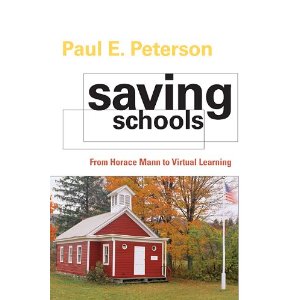National scholarship on education
NCLB had its day and advanced some useful trends at the state and local level. But it has foundered on a couple of major shoals, including the downward pressure it applied on the quality of state assessment systems and its inability to advance school options for students in chronically failing schools.
With the limbo that NCLB has been in, a number of scholars have looked at the national landscape on education policy, including Diane Ravitch (The Death and Life of the Great American School System — buy it at Amazon for $16 rather than $26 at Borders!) and Paul Peterson (Saving Schools — buy it at Amazon for $17 rather than $27 at Borders!). Both give broad historical reads on education policy, but in the titles of each already is a different perspective. While Diane takes an overall “system” perspective, Paul is focused on schools.
I know Diane’s come under a lot of criticism for her book, but I found a lot that is useful in it. Where I really part ways is that she has the tendency of folks who have worked in federal government to look at policy from a federal perspective. I know that is a tautology but I mean it. The feds pay 10% at most for education, with localities and states picking up the big 90 % chunk. So when she talks about charters, for example, she looks at overall charter performance, which for me is nonsensical. The MA charter law, together with high academic standards and assessments, has given us great charters for the most part. Other states have weaker laws, weaker complementary policies on standards and assessments, and – golly gee wilikers – weaker charters.
So the “federal” perspective has real limits in making sense of reforms that are largely state and local.
Paul’s book has the great merit of remaining relevant for federal, state and local policy. He has worked on local experiments (Milwaukee and elsewhere) and also given lots of policy input to federal officials. The book is a great resource, and a full throated call to advance virtual learning in all schools, whether district, charter, private and beyond. One of the heroines of the book, Julie Young, the CEO of the Florida Virtual Schools, won the Better Government Competition grand prize in 2008– see electronic page 8.


